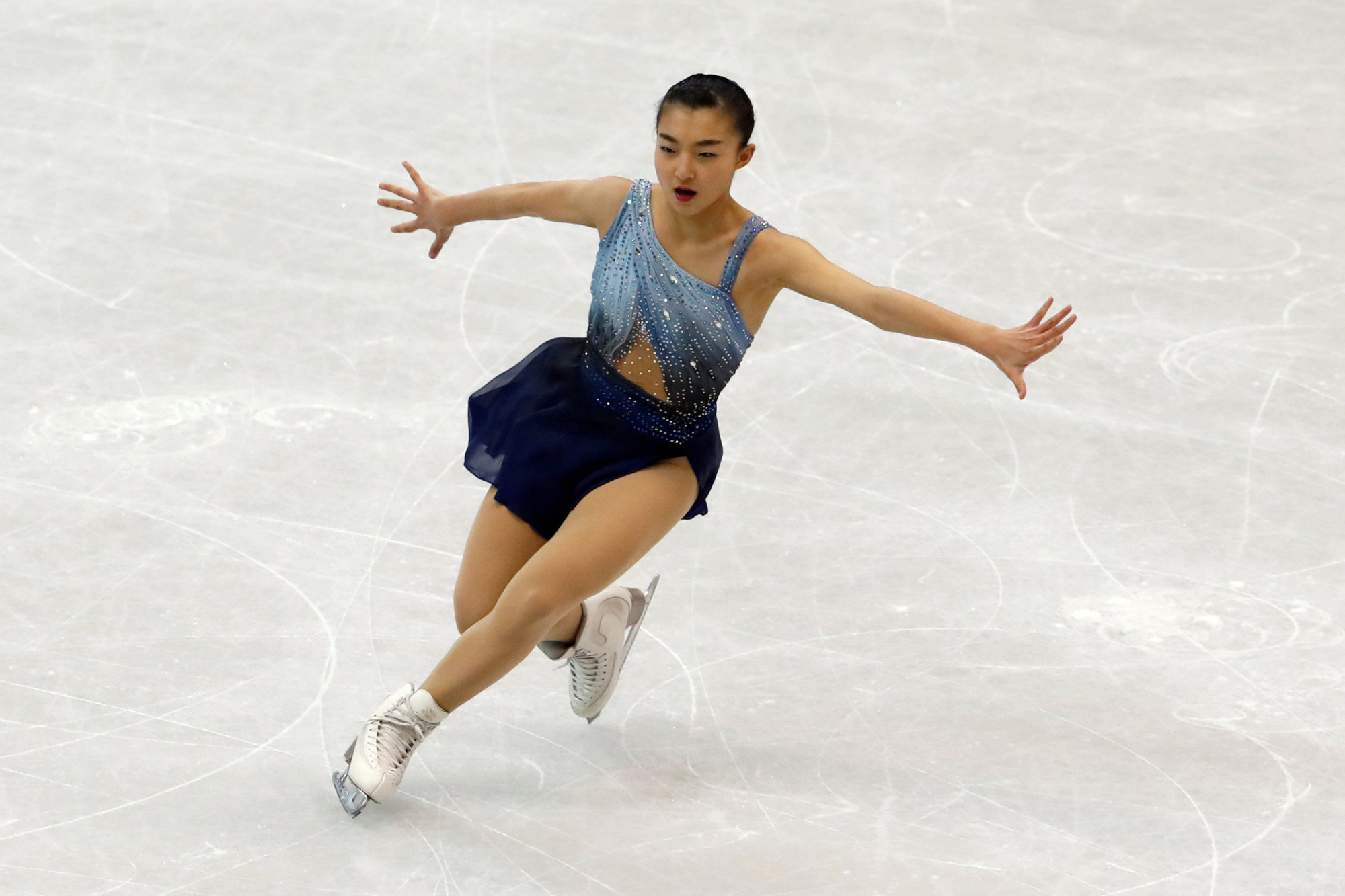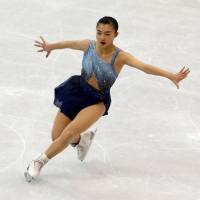Kaori Sakamoto's ascendancy continues unabated.
The 17-year-old from Kobe has quickly become one of skating's rising stars.
Her resounding victory at the Four Continents Championships on Friday in Taipei the latest example of her exceptional ability and fortitude.
Trailing compatriot Satoko Miyahara by 0.40 of a point after the short program, Sakamoto blew the doors off it in her free skate to "Amelie." With each successive competition her talents are becoming more evident.
Sakamoto will carry huge momentum into the Pyeongchang Olympics next month.
She cleanly landed seven triple jumps in a fantastic performance that had Olympic Channel analyst and ice dance Olympic gold medalist Charlie White raving about her.
The high schooler opened her free skate with a huge triple flip/triple toe loop combination.
White's response: "Wow."
It's one thing to hear that coming from somebody who has never done it before, but to have it coming from White gives it an entirely different meaning.
In addition to his gold medal from the 2014 Sochi Games, White, along with partner Meryl Davis, is a two-time world champion and a five-time winner of the Grand Prix Final.
His bona fides are about as legit as they come.
"Great use of the music on the step sequence," White stated while reviewing the replay of Sakamoto's free skate. "Very interesting moments connecting with the judges, bringing personality to the music.
"She continues to make these jumps look so easy. Seemingly as much energy ending her program as she started with. A hugely impressive performance."
White was especially taken by Sakamoto's speed and ability to elevate.
"Incredible height. So much speed into and out of her jumps," White noted. "Her style of skating is her own. She is not the most graceful skater. But what she did in this program was, with miming, she told a story. She put her spin on a piece of music that is popular in figure skating.
"We could watch these jumps all day," added White. "Picture perfect technique. So well trained."
White's comments prompted Ice Time to come up with a nickname for the young star — "Superfly" Sakamoto.
In the slang of the day (early 1970s) the term meant "cool" or "excellent." So that definitely works. Add in Sakamoto's jumping ability, and well, you get it.
"Superfly" registered new personal bests for the short program, free skate and total score with a total tally of 214.21 points in Taiwan to capture her first major senior international title.
The bigger the challenge, the more Sakamoto rises to meet it.
"I skated here at junior worlds last year and I did a clean short and long program, so I have a good memory at the rink," Sakamoto commented to the ISU website after her victory. "That made me feel confident and I was able to skate comfortably."
Sakamoto was also buoyed by the presence of training partner Mai Mihara, who was impressive in finishing second with 210.57. Mihara has been a real champion in her support of Sakamoto, after failing to make Japan's Olympic team for the Pyeongchang Games.
Certainly Mihara is heartbroken she did not make the team herself, but she never lets it show and admirably backs Sakamoto every chance she gets.
A big part of succeeding in skating comes down to building a reputation with the judges. Sakamoto continued to do that at the Four Continents.
Between the short program and free skate, comprising 171 marks, Sakamoto received not a single negative grade of execution from any of the nine judges. Truly impressive.
Mihara, who won the Four Continents last season but had struggled with inconsistency this season, acquitted herself very nicely in Taipei.
White was impressed with Mihara's poise in her short program to "Libertango."
"Looking very confident on her jumps and in her skating as well," White observed. "Really taking command out there on the ice."
White had praise for the construction of Mihara's short program and her ability to execute it.
"I think this program suits her well. The choreography is very well done," White analyzed. "Well-executed jumps and spins. Really nice edge work, good knees. Her skating ability is very nice."
Mihara was nearly five points behind Miyahara going into the free skate, but blew past the four-time national champion by hitting six triples and getting level-fours on her spins in her skate to "The Mission."
"Another fantastic skate from Mai Mihara," White said at the end of Mihara's free skate. "Amazing, amazing skate from her. Just brimming with confidence. Great jumps. Everything where it needed to be."
While White bemoaned the fact that Mihara would not be on the Olympic team, he believes her future is still bright.
"It's really too bad," White stated. "But she is going to be sticking around and be reckoned with moving forward."
Mihara was critical of her effort in the free skate.
"I am a little bit happy. My performance was not perfectly clean," the ISU site quoted Mihara as saying. "I got an under-rotation on the triple lutz and I am a bit frustrated about that. I felt nervous before my program, but I tried my best."
The biggest surprise coming out of the Four Continents was the third-place showing of Miyahara (207.02). After looking solid in her short program to "Memoirs of a Geisha," the Kyoto native came undone in her free skate.
White was floored by Miyahara's elegance in the short program.
"I don't think there is a single skater who has a better idea of what they are looking to accomplish than Satoko," White commented. "Every detail is perfected.
"Simply an amazing performance," White added. "Bringing her absolute 'A' game to this competition. She is just an absolute delight to watch. I could watch her skate all day. I wish that program had continued. Just a breath of fresh air."
White singled out what he liked most in Miyahara's short program.
"She appreciates and understands what makes figure skating special," White said. "She seeks to always do her best to deliver that to the judges and fans. It's an attention to detail. It's movement across the ice. The speed and attention to every detail."
Unfortunately for Miyahara, her free skate to "Madame Butterfly" was a much different story.
The 19-year-old under-rotated a triple toe loop in her first combination jump and a triple lutz at the beginning of her three-combo jump later. She then fell on her triple salchow.
The bobble that Ice Time felt might occur for Miyahara at the Japan nationals instead took place a month later with international judges that are less forgiving than domestic ones.
"Uncharacteristic mistake on the triple salchow," White stated. "Rushed the takeoff. Was too far over her left side."
White then brought out into the open a fact that is plain as day.
"The size of her jumps don't compare to that of her Japanese teammates," White commented. "That is reflected in the GOE. Probably not able to keep up. Over the length of the long program that adds up."
Despite the disappointing result for Miyahara, White tried to put it in the proper perspective.
"It is not necessary that she be perfect here," White said. "She needs to get this under her belt. She was injured. She has missed quite a few competitions. Heading into the Olympics, that is what she wants to peak for. That is where she is going to be fighting for an Olympic medal."
After the medal ceremony the usually stoic Miyahara broke down in the press conference.
"I have a lot of regrets about today's performance," Miyahara commented. "When I came here my jumps were not so perfect and I think that made me uncomfortable and affected my confidence. I want to fix that before the Olympic Games. My body is in perfect condition; the problem is in my mind. I was mentally weak."
While that is clearly not true, it seems more likely that the frustration with not being able to keep up with her younger teammates had gotten to Miyahara.
The 2015 world silver medalist has been a great champion through the years and now must pull herself together before skating on the world's biggest stage in South Korea.
Shoma settles for second
Shoma Uno (297.94) took second place at the Four Continents behind a healthy and revitalized Jin Boyang (300.95) of China, but showed he is in good form heading into the Olympics.
White raved about Uno's short program to "Winter," which gave him a narrow lead over Jin going into the free skate.
"I'm just so impressed with a skater at such a young age," the 30-year-old White stated. "The maturity that he shows, the confidence, the precision, the musicality. Every movement is completely under control. It just creates an aura of power and expertise."
White cited Uno's triple axel for its excellence.
"That triple axel, so easy," White commented. "The spread eagle in and out of it."
Despite falling on his quad flip in his free skate to "Turandot," White still gave Uno high marks.
"A masterful performance from Shoma Uno. Absolutely incredible," White said.
White liked how Uno bounced back from the fall in the rest of the program.
"A testament to his training. His endurance," White stated. "The amount of technical difficulty filling that program more than making up for the mistake on the quad flip."
Uno was satisfied despite the result.
"Unfortunately I missed my quad flip, but the good part was that I kept calm and finished the program nicely," Uno said. "I didn't do my best today, but I still think the practice was not a waste. I would like to be more confident and take it to the next competition."
Keiji Tanaka (260.31) came in fourth after being in third following the short program.
First medal in ice dance
Not to be overlooked at the Four Continents was the performance of Kana Muramoto and Chris Reed in ice dance. The duo gave Japan its first medal ever in the event in a major senior international competition by taking the bronze.
Muramoto and Reed joined winners Kaitlin Hawayek and Jean-Luc Baker of the United States, and second-place finishers Carolane Soucisse and Shane Firus of Canada on the podium.
Japan will be counting on Muramoto and Reed to come through with a solid performance at the team competition in Pyeongchang.
Bavarian Open
Rin Nitaya scored a resounding victory at the Bavarian Open in Oberstdorf, Germany, over the weekend. Nitaya, a 20-year-old from Nishinomiya, Hyogo Prefecture, bested compatriot Yura Matsuda by more than 20 points to win the title.
Nitaya hit six triples to win with a total of 185.44, while Matsuda earned a score of 165.42 to make the podium.
Meanwhile, Kazuki Kushida and Shun Sato finished first and second in the junior men's category.
Telling it like it is
Ice Time came across a nice story Saturday on Dr. Peter Gerbino, who will be the team physician for the U.S. skaters in Pyeongchang, in the Monterey County (California) Herald.
While doing his fellowship training in sports medicine in Boston in the 1990s, Gerbino worked with local skating clubs in the area.
The story said Gerbino was impressed by skaters' "drive and dedication to the sport, the time and sacrifices they put into perfecting an art on ice."
"Once I started working with the skaters, I realized what exceptional athletes they were and the stress they go through to prepare for their routines," Gerbino said.




















With your current subscription plan you can comment on stories. However, before writing your first comment, please create a display name in the Profile section of your subscriber account page.